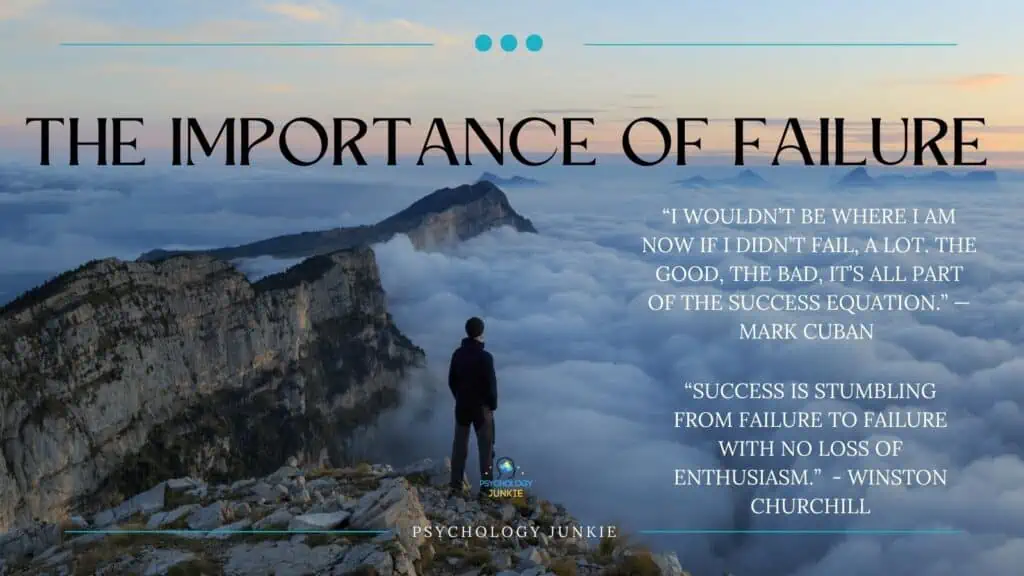How to Embrace Failure (and Why You Should), Based On Your Myers-Briggs® Personality Type
Lupita Nyong’o once shared, “It’s only when you risk failure that you discover things. When you play it safe, you’re not expressing the utmost of your human experience.” This profound insight perfectly encapsulates the intrinsic value of failure, an often disregarded aspect of personal growth. Yet we often avoid failure like the plague; running in the opposite direction and playing it safe. When we do encounter failure, we want to hide away and avoid putting ourselves in that same situation again! But failure is so important. Getting comfortable with it is crucial if you want to do anything really impactful in life.
In the realm of typology, each personality type possesses unique strengths that can make them stand out from the crowd. However, if someone is so consumed by the fear of failure that they don’t utilize those strengths to the best of their ability, they will never reach the potential they could. It is through “failure,” this seeming setback, that we uncover fresh perspectives, acquire wisdom, and tap into the depths of our resilience. The willingness to risk failure, therefore, is not just a courageous act, but also a crucial component of our journey towards self-discovery and personal evolution.

In today’s article, we’re going to explore why each of the 16 Myers-Briggs® personality types should embrace experimentation, risk, and, yes, failure – and why they might choose to play it safe instead.
Let’s begin!
Not sure what your personality type is? Take our personality questionnaire here. Or you can take the official Myers-Briggs Type Indicator (MBTI®) here.

Table of contents
Estimated reading time: 32 minutes
Why You Should Embrace Failure, Based On Your Myers-Briggs® Personality Type
The ENFJ
“The only real mistake is the one from which we learn nothing.” – Henry Ford
ENFJs, known for their compassionate nature and exceptional interpersonal skills, innately strive to foster harmony and happiness in their surroundings. This personality type, often referred to as the ‘Mentor’, is significantly attuned to the emotions of others and is driven by a profound desire to uplift those around them and lead them towards a higher calling. However, in this noble endeavor, they may inadvertently compromise their personal aspirations or suppress their opinions. Here are some examples of how this can show up:
- ENFJs are known for prioritizing the needs of others, sometimes to the detriment of their own. They might put aside their dreams to support the ambitions of those around them.
- The quest for harmony may deter them from expressing conflicting views, avoiding potential discord at the cost of their personal convictions.
- Because Introverted Thinking is their inferior function, they can struggle to express their unfiltered logical thoughts, worrying that they aren’t “correct enough.” Instead, they may choose to analyze an idea to death or keep their thoughts inside while outwardly “going along.
By continually sidelining their dreams and silencing their voices, ENFJs deny themselves the opportunity to fully realize their potential. Taking the risk to disrupt the peace, to follow their dreams, and to express their thoughts unfiltered is crucial. It’s about honoring and acknowledging their needs and desires. It’s about stepping into their power and authentically expressing who they are.
Martin Luther King Jr., a renowned ENFJ personality type, serves as a powerful example of embracing failure and taking risks. Known for his relentless pursuit of racial equality and civil rights in the United States, King faced numerous failures and risks in his journey. Despite numerous arrests, threats to his life, and constant opposition, King did not back down. He was not dissuaded by these obstacles; instead, he used them as stepping stones to advance his cause. He stood against societal norms and jeopardized his personal life for the larger good, embodying the ENFJ trait of prioritizing the collective over personal gain. His eloquent articulation of his vision, regardless of the criticism and controversy it might stir up, displayed his courage to voice his thoughts unfiltered.
King displayed immense resilience in the face of fear and setbacks. His life is a testament that “failure” is not the end but a stepping stone towards success, a lesson for all ENFJs to take to heart. By risking failure, ENFJs can achieve their aspirations and, in doing so, inspire others to dream more, do more, and be more. King loved Gandhi, and he lived by Gandhi’s quote: “Strength does not come from physical capacity. It comes from an indomitable will.”
Yes, there’s a possibility you might fail when you express your true opinions or go after your dreams. You might disrupt the peace, face rejection, or face obstacles. But it is precisely in these moments of failure that you can find your deepest growth. Failure propels introspection, paving the way for self-awareness and resilience. It teaches you that your worth isn’t tied to the approval of others or a seamless pursuit of your goals. Rather, it lies in your ability to remain true to yourself, to learn from every setback, and to persistently strive towards your dreams, regardless of the hurdles you encounter. This transformation in perspective is crucial to your journey of personal evolution, turning failure from a dreaded end to a conduit for growth.
Find out more about ENFJs: 5 Things People Misunderstand About ENFJs
The ENFP
“There is only one thing that makes a dream impossible to achieve: the fear of failure.” – Paulo Coelho
ENFPs, often regarded as the ‘Visionaries’, are renowned for their creativity, optimism, and zest for life. Their minds are constantly brimming with ideas and possibilities, making them enthusiastic initiators of projects. However, this same propensity can become a double-edged sword when the fear of failure creeps in. It’s not uncommon for ENFPs to hop from one exciting project to the next, driven more by distraction rather than completion, as a means to dodge the potential risk of failure.
Walt Disney, a legendary figure and likely an ENFP, provides an excellent example of embracing failure. His journey to success was fraught with numerous rejections and setbacks. One of the most prominent examples was when he was fired from a newspaper job early in his career on the grounds of being “lacking in imagination” and “having no good ideas.” Undeterred by this, Disney took this failure as a stepping stone and moved on to establish his own animation company, which eventually went bankrupt. Yet, he never let these failures deter his dreams and passion. Instead, he learned from each failure and persisted with his creative endeavors. His resilience finally paid off when he created Mickey Mouse – a character that brought about the turning point in his career and a worldwide icon adored by millions. Walt Disney’s journey is a testament to the ENFP’s potential to transform failure into success, emphasizing the power of perseverance, creativity, and undying optimism.
Here are a couple of examples of how an ENFP might avoid failure:
- An ENFP might start writing a book with enthusiasm but abandon it midway for a new venture, like learning a musical instrument. This isn’t because they lack dedication, but because the untested waters of the new project seem less daunting than the possibility of failing at finishing their book (or they simply got bored).
- An ENFP may ruminate on a past mistake or failure as a way to stop themselves from taking a new risk. They might spend hours replaying a failed presentation in their head, scrutinizing every detail, instead of using that energy to prepare for the next opportunity.
- Because ENFPs have inferior Introverted Sensing, they may feel uncertain around doing detailed, focused, or repetitive tasks. Once they get to the point in a project where that’s required, they may simply shift to another project because they worry they’ll make big mistakes when it comes to the details.
This avoidance of risk and fear of failure can limit the growth of ENFPs. Taking risks is essential in pushing boundaries, exploring uncharted territories, and ultimately, sparking personal growth. Failure, in this context, isn’t a dead-end, but rather a stepping stone toward self-improvement. If an ENFP fails at a task, whether it’s finishing a book, learning a new skill, or missing an important detail, they gain invaluable lessons out of that experience. They learn about their strengths, pinpoint areas for improvement, and the next time it gets easier. Plus they learn who’s really there for them, rain or shine. Friends who stick through the failure, who still believe in them and support them, these are the friends that matter.
Vitally, ENFPs realize that failure is not a reflection of their self-worth, but rather an integral part of their journey towards achieving their goals. By embracing failure, ENFPs can break free from the shackles of fear, allowing them to commit more fully to their projects, express their creativity uninhibitedly, and ultimately, reach greater heights of personal growth.
Find out more about ENFPs: Dealing with Emotional Overwhelm as an ENFP
The ENTJ
“Vulnerability is not winning or losing; it’s having the courage to show up and be seen when we have no control over the outcome.” – Brené Brown
ENTJs, often referred to as ‘The Commanders’, are known for their strategic thinking, assertiveness, and ability to take swift action. Their confidence and quick decision-making abilities enable them to take calculated risks and make substantial progress in their chosen endeavors. However, this action-oriented and thinking-driven personality can sometimes cause them to shirk from expressing their true emotions, fearing the risk it may pose to their relationships or their self-image. The fear of being vulnerable or experiencing “emotional failure” can be a significant hurdle for ENTJs.
Here are a few instances of how this fear might manifest for ENTJs:
- ENTJs are often more comfortable with thinking than feeling, and may disregard their own emotions or those of others as inconsequential to avoid dealing with them.
- They might push their feelings to the backburner to focus on their goals, neglecting the importance of emotional well-being in their pursuit of success.
- ENTJs may dodge expressing their true feelings in relationships, fearing that showing vulnerability may lead to failure or rejection.
- They might mask their insecurities or fears behind a confident façade, unwilling to show any perceived weakness.
As Brené Brown emphasizes, embracing vulnerability is not a sign of weakness but an act of courage. It’s essential for ENTJs to recognize that taking emotional risks, like expressing true feelings or addressing emotional conflicts, is just as vital for personal growth as taking strategic risks in their professional lives. Fearing the failure of emotional vulnerability can limit their emotional depth and hamper the development of genuine, meaningful relationships. In the event of a perceived emotional “failure”, ENTJs should remember that these instances are not defeats but opportunities for growth and understanding. They present invaluable lessons about their emotional needs, their capacity for empathy, and their resilience in the face of shame or vulnerability. By accepting and expressing their emotions, ENTJs can enrich their life experiences and form deeper, more fulfilling relationships, fostering personal growth beyond their professional achievements.
Find out more about ENTJs: How ENTJs Say “I Love You”
The ENTP
“No human ever became interesting by not failing. The more you fail and recover and improve, the better you are as a person. Ever meet someone who’s always had everything work out for them with zero struggle? They usually have the depth of a puddle. Or they don’t exist.” – Chris Hardwick
ENTPs, also known as ‘The Trailblazers’, are recognized for their quick wit, questioning minds, and capacities for innovation. ENTPs possess a unique ability to view problems and situations from multiple perspectives, allowing them to devise creative solutions. This can, however, lead to a hesitancy to commit to one path, for fear that it may not be the best or most efficient solution, thereby causing a potential ‘failure’.
Consider Steve Wozniak’s journey with Apple. The launch of the Apple III in 1980 was a commercial failure due to a series of technical issues. It would have been easy for Wozniak to view this as a catastrophic failure and stop experimenting. Instead, he chose to view it as a learning experience. The lessons learned from the Apple III’s failure were instrumental in the development of the successful Apple Macintosh.
Here are a few ways ENTPs might grapple with the fear of failure:
- ENTPs may start multiple projects at once, but struggle to see them through to completion, fearing that sticking with one project may lead to the failure of others.
- They might avoid making decisions or taking action until they have examined every possible outcome, trying to ensure success but risking inaction and stagnation.
- They might avoid expressing their feelings or committing to relationships, fearing that it may “trap” them or make them feel stuck
- Because they have inferior Introverted Sensing, ENTPs might feel uncertain and insecure in situations that require a lot of attention to detail or repetitive, focused effort. When they start to feel overwhelmed by the details or trapped by the repetition, they may simply shift gears to another project.
In the face of failure, ENTPs should remember Wozniak’s example and view every setback or ‘failure’ as a stepping stone to success, rather than a final destination. Such failures are opportunities to learn, adapt, and grow. They provide valuable lessons in resilience, adaptability, and strategic thinking. By embracing failure, ENTPs can continue to push boundaries, challenge conventions, and achieve their goals with a tenacity that is uniquely their own. Hence, by embracing failure, ENTPs can unlock their full potential for innovation and drive their personal growth journey forward.
The INFJ
“Giving up is the only sure way to fail.” – Gena Showalter
INFJs, often referred to as ‘The Advocates’, are well-known for their ability to understand and empathize with others on a profoundly deep level. Typically, they hold strong convictions and have a clear vision of how things should be, which drives their actions. However, this intense focus on their internal world and ideals can sometimes lead to a sense of perfectionism and fear of making mistakes, causing potential ‘failure’.
Take, for instance, the celebrated writer and women’s rights advocate, Mary Wollstonecraft. She experienced numerous hardships and setbacks throughout her life, from personal tragedies to public scorn for her unconventional views. Yet, she did not let these failures deter her. Instead, they fueled her passion for championing women’s rights, eventually leading to her seminal work, “A Vindication of the Rights of Woman”. Her courage in the face of failure and rejection is a testament to the strength and resilience that INFJs possess.
Here are a few instances of how the fear of failure might manifest in INFJs:
- INFJs may hesitate to take action on their visions or ideas, fearing that they may not live up to their idealized expectations or standards.
- They might avoid expressing their true feelings or thoughts, worrying that others may not understand or accept them.
- They might feel overwhelmed by the details or realities of the present moment due to inferior Extraverted Sensing, leading them to retreat into their inner world and causing inaction.
- INFJs may try so hard to be what other people want them to be that they put their own individualistic dreams and desires on the backburner
INFJs, like Wollstonecraft, should remember that setbacks and failures are not signs of weakness, but opportunities for growth and self-improvement. By embracing their failures and viewing them as pathways to success and self-awareness, INFJs can break free from the constraints of perfectionism and move towards actualizing their vision. Learning that sometimes “good enough” is perfect can help INFJs to experiment, learn through trial-and-error, and experience greater heights of innovation. The journey towards their ideal world may not be perfect, but it is through overcoming the challenges along the way that the true strength of their convictions shines through.
Discover more about INFJs: Honoring Your Inner Child as an INFJ
The INFP
“Our doubts are traitors, and make us lose the good we oft might win, by fearing to attempt.” – William Shakespeare
INFPs, often referred to as ‘The Mediators’, are renowned for their passion, idealism, and empathetic nature. They are driven by their deeply-held values and a desire to work towards the betterment of humanity. However, their intense idealism and high personal standards can sometimes lead to a fear of not living up to their own expectations, resulting in potential ‘failure’.
Let’s consider William Shakespeare, arguably the greatest playwright of all time and a likely INFP. His plays were not always well received during his lifetime, and he faced his fair share of failures and setbacks. He was often booed and jeered off the stage as an actor. He frequently experienced writers block. At the age of 13 he had to leave school to help his family by working on the farm. Yet, even if he mourned for a period, he never let criticism or failure stop him from his writing. Instead, he used these experiences as fuel to continue creating, resulting in a body of work that continues to be celebrated centuries after his death.
Here are a few ways the fear of failure might appear in INFPs:
- INFPs may hold back from expressing their creative ideas or visions, worrying they may not be perfect or live up to their ideals.
- They might replay memories of negative experiences where they tried and failed and use that as a reason to avoid trying again.
- They may take critique especially hard, folding in on themselves and quitting their efforts towards a dream and getting lost in feelings of inadequacy.
INFPs, taking a leaf from Shakespeare’s book, should remember that failure is not a reflection of self-worth, but a natural part of life’s journey. By learning to view failure as an opportunity for growth and learning, they can continue to pursue their ideals without the fear of imperfection holding them back. By embracing criticism, even if it stings, they can continue to innovate, inspire, and make the world a better place with their unique vision. Because everyone who’s ever done anything worth remembering has failed at some point along the way.
Discover more about INFPs: The INFP Fi-Si Loop: What It Is and How to Cope
The INTJ
“Failure is the condiment that gives success its flavor.” – Truman Capote
INTJs, often known as ‘The Architects’ or ‘Strategists’, are celebrated for their strategic minds, thirst for knowledge, and drive to transform their visions into reality. They typically have a clear and detailed plan for their projects, and their perfectionism and high standards can sometimes lead to a fear of making mistakes, causing potential ‘failure’.
Consider Isaac Newton, one of the most influential scientists of all time and a likely INTJ. Despite his astonishing scientific achievements, Newton was notorious for his reclusiveness, depression, anxiety, and fear of criticism. He delayed the publication of his ‘Principia Mathematica’, one of the most important works in the history of science, for almost two decades due to fear of criticism. It was only when his friend and fellow scientist, Edmund Halley, personally financed the publication that Newton finally agreed to share his groundbreaking theories with the world.
Here are a few ways the fear of failure might show in INTJs:
- INTJs may not act on their plans or ideas, fearing that they might not be flawless or meet their exacting standards.
- They might avoid taking risks or engaging in trial-and-error, seeing mistakes as major failures rather than opportunities for learning.
- They may be overly self-critical and harsh on themselves when they make a mistake, viewing it as a serious flaw in their character.
INTJs should remember that failure is not a sign of inferiority, but a path (albeit sometimes a rocky one) to success. By embracing their mistakes and viewing them as opportunities to learn and improve, INTJs can break free from the shackles of perfectionism and actualize their visions. Even if their plans don’t unfold flawlessly, the knowledge and experience gained from the process can pave the way for greater achievements in the future. As Newton once said, “No great discovery was ever made without a bold guess.” It’s important to remember that the path to success is not always linear, and life’s unpredictability is what makes the journey worthwhile.
Discover more about INTJs: 10 Things People Misunderstand About INTJs
The INTP
“My great concern is not whether you have failed, but whether you are content with your failure.” – Abraham Lincoln
INTPs, often called ‘The Thinkers’ or ‘Architects’, are known for their inventive and original thinking, and their relentless pursuit of knowledge. They enjoy analyzing, theorizing, and pondering complex problems. However, the intricacy of their thoughts and the fact that many people find them overly-complex, can lead INTPs to struggle with self-doubt and a fear of potential ‘failure’.
Consider Abraham Lincoln, the 16th President of the United States and a likely INTP. Despite his humble beginnings and lack of formal education, Lincoln was a self-taught lawyer with a keen intellect and a remarkable ability to communicate complex ideas in a relatable way. Even so, his road to the presidency was fraught with setbacks and failures. He failed in two business attempts, lost his first attempt to get a seat in the Illinois legislature, was defeated in his first run for the U.S. Congress, and was twice unsuccessful in his applications to law schools. He suffered heartbreak, failures, and severe emotional pain. However, he did not stop in his attempts to change the world. Instead, he used them as a springboard for self-improvement and ultimately achieved his goal of becoming President.
Here are a few ways the fear of failure might manifest in INTPs:
- INTPs might refrain from sharing their ideas with others, fearing that they will be misunderstood or rejected.
- They might avoid taking risks in interpersonal relationships, worried about how they will be perceived by others.
- They might overanalyze situations and potential outcomes to the point of inaction, paralyzed by the fear of making the wrong decision and failing.
INTPs should remember that failure is not a reflection of self-worth, but rather an opportunity for growth and learning. Embracing failure and viewing it as a journey to further understanding can help INTPs overcome their fear of sharing their ideas and insights with the world. As Lincoln once said, “Adhere to your purpose and you will soon feel as well as you ever did. On the contrary, if you falter, and give up, you will lose the power of keeping any resolution, and will regret it all your life.”
The courage to face failure and learn from it is what truly matters, and in doing so, one can build grit and wisdom. By understanding that rejection is not personal and that everyone makes mistakes, INTPs can find the confidence to express their unique insights and ideas, enriching the world with their creativity and intellect.
Discover more about INTPs: A Look at the INTP Leader
The ESFJ
“You may encounter many defeats, but you must not be defeated. In fact, it may be necessary to encounter the defeats, so you can know who you are, what you can rise from, how you can still come out of it.” – May Angelou
ESFJs, often labeled ‘The Caregivers’ or ‘Providers’, are renowned for their warmth, genuine interest in people, and ability to navigate social situations with grace and tact. They have a natural inclination to put others’ happiness above their own, striving to meet the needs of those around them and create a harmonious and stable environment. However, their deep concern for others and their desire for stability and routine can sometimes lead them to overlook their own interests and avoid taking risks, which can lead to dissatisfaction and a pervading fear of failure.
Consider Hugh Jackman, the acclaimed actor and performer, and a likely ESFJ. Jackman is beloved for his amiable persona, both on-screen and off-screen, and his commitment to his family and charitable works. However, despite his successful career, he has spoken candidly about his struggles with anxiety and fear of failure. In the pursuit of perfection and meeting the high expectations set by others, Jackman often found himself in a state of anxiety, worrying excessively about the outcome of his performances and the reception from audiences.
Here are a few ways the fear of failure might manifest in ESFJs:
- ESFJs might neglect their own interests or passions, focusing excessively on pleasing others and maintaining harmony.
- They might avoid situations that could potentially lead to conflict or disapproval, restricting their growth and exploration.
- They might resist changes or taking risks, preferring the safety of routine and predictability, even if it limits their opportunities.
ESFJs should remember that caring for oneself is as important as caring for others. It’s okay to follow your own interests and desires, even if they differ from others’ expectations. Embracing the uncertainty and seeing it as a chance for growth can help ESFJs step out of their comfort zones and discover new passions and perspectives. As Gilda Radner once said, “[Life is about] not knowing, having to change, taking the moment and making the best of it, without knowing what’s going to happen next.” The journey to personal growth may not always be comfortable, but it’s through this process that we learn the most about ourselves and our capabilities.
Discover more about ESFJs: 24 Signs That You’re an ESFJ, the Defender Personality Type
The ESFP
“You don’t learn to walk by following rules. You learn by doing, and by falling over.” – Richard Branson
ESFPs, often described as ‘The Entertainers’ or ‘Performers’, are characterized by their vivacious spirit, spontaneity, and ability to inspire those around them. Their natural affinity for social interaction and their desire to bring joy and excitement to others’ lives makes them magnetic personalities. However, their propensity for living in the moment and their willingness to take risks can sometimes lead to impulsive decisions, which may result in perceived failures.
Consider Richard Branson, the renowned entrepreneur and founder of the Virgin Group, and a likely ESFP. Branson is acclaimed for his adventurous spirit, bold business strategies, and his unmatched ability to engage and motivate people. Despite dropping out of school at the age of 16 and failing in many business efforts, Branson continued to persevere and take risks, eventually building one of the most successful and diverse empires in history. He once said, “Above all, you want to create something you are proud of. That’s always been my philosophy of business. I can honestly say that I have never gone into any business purely to make money. If that is the sole motive, then I believe you are better off doing nothing.”
Here are a few ways the fear of failure might manifest in ESFPs:
- ESFPs might make impulsive decisions without fully considering the potential outcomes, leading to unintended consequences. This may give them the ingrained belief that they shouldn’t put a lot of effort into any one thing because it might also fail.
- They might be overly reliant on external validation, which can cause them to view any form of criticism or rejection as a failure.
- They might avoid situations that involve planning or long-term commitment, fearing they will not be able to meet the expectations or achieve the desired results.
ESFPs should remember that every experience, whether perceived as a success or failure, is an opportunity for learning and personal evolution. Embracing potential setbacks as part of the journey, as catalysts towards improvement, rather than viewing them as an endpoint is essential. This change in mindset can help ESFPs to continue pursuing their passions and inspiring others along the way. As Branson has stated, “Do not be embarrassed by your failures, learn from them and start again.” This resilience in the face of failure is the mark of a true ESFP, turning every stumble into a step forward on their path of personal growth.
Discover more about ESFPs: The ESFP Se-Te Loop: What It Is and How to Cope
The ESTJ
“Failure is simply the opportunity to begin again, this time more intelligently.” – Henry Ford
ESTJs, often labeled as ‘The Executives’ or ‘Administrators’, are well known for their pragmatic approach, organizational skills, and relentless determination. Their inherent ability to manage procedures and people lends itself to their role as natural leaders. However, they can be surprisingly risk-averse when it comes to relationships or testing new ways of doing things. They may cling to familiar relationships or situations, even if they aren’t fulfilling, simply because they are known and therefore deemed safe.
Henry Ford, automotive pioneer and founder of the Ford Motor Company, is a likely ESTJ. His pioneering vision revolutionized industrial production, but his journey was not without failure. He faced bankruptcy with his first two automotive companies. However, he didn’t let these setbacks deter him. On the contrary, he used them as learning experiences, gathering valuable lessons that paved the way for his later success. It’s Ford who famously said, “The only real mistake is the one from which we learn nothing.”
Here are a few ways the fear of failure might manifest in ESTJs:
- ESTJs might maintain relationships or situations that are no longer beneficial or fulfilling, simply because they are familiar and comfortable.
- They might avoid exposing their vulnerabilities or sharing their true feelings, for fear of rejection or failure.
- They might resist trying new things or making changes, preferring the certainty of the “tried-and-true” over the uncertainty of the unknown.
ESTJs need to remember that stepping out of their comfort zone is often the first step towards significant growth. Every failed attempt, every rejected proposal, serves as a lesson, a guidepost on the path to success. By embracing vulnerability and uncertainty, they open themselves up to new experiences and deeper relationships. As Henry Ford’s journey shows, failure is not the end, but rather a steppingstone to greater ventures.
Discover more about ESTJs: What It Means to be an ESTJ Personality Type
The ESTP
“It is not the critic who counts, not the man who points out how the strong man stumbled, or where the doer of deeds could have done better. The credit belongs to the man who is actually in the arena.” – Theodore Roosevelt
ESTPs, often referred to as ‘The Adventurers’ or ‘Daredevils’, are known for their energetic, pragmatic, and perceptive nature. Always ready to face a challenge and quick to adapt to new circumstances, ESTPs have a natural knack for navigating dynamic and unpredictable situations. They thrive in environments that offer excitement, novelty, and immediate feedback. However, their preference for spontaneity and immediate results may make them wary of situations that require long-term commitments or detailed planning. In addition, even though they typically exude confidence and a ‘can-do’ attitude, they might find it challenging to open up emotionally and be vulnerable with others, as they always want to maintain their image of self-assurance and resilience.
Theodore Roosevelt, the 26th President of the United States, is a likely ESTP. Known for his dynamic leadership, courage, and pioneering spirit, Roosevelt was not one to shy away from risks or challenges. His famous quote, “Do what you can, with what you have, where you are”, encapsulates the typical ESTP mindset – practical, adaptable, and action-oriented. However, even Roosevelt, known for his ‘rough and ready’ persona, faced difficulties throughout life. Born weak and sickly, with debilitating asthma, Theodore found it hard to live up to to his fiercely competitive family. But he didn’t let his frailty stop him; instead, he defied the odds and strengthened himself both mentally and physically. Later in life, he also faced several political defeats and personal tragedies. But every time he refused to give up; as Roosevelt expressed himself, “It is hard to fail, but it is worse never to have tried to succeed.”
Here are a few ways the fear of failure might manifest in ESTPs:
- ESTPs may avoid commitments or situations that require long-term planning or dedication, fearing they will not be able to maintain their interest or deliver on their promises.
- They might resist sharing their emotional vulnerabilities or insecurities with others, always wanting to project an image of confidence and strength.
- They might often take quick, impulsive decisions, preferring immediate results over carefully planned outcomes.
For ESTPs, accepting failure as a part of life’s journey can unlock unprecedented levels of happiness, personal growth, and deeper sense of purpose. This acceptance serves as a transformative shift in perspective, one that brings them closer to their authentic selves. ESTPs are naturally well-equipped to rise from the ashes of failure, thanks to their uncanny knack for swift adaptation and problem-solving. However, opening up emotionally can often be a daunting task, given their innate desire to project resilience and assurance.
Embracing vulnerability, being honest about their emotions, and allowing others to see their true selves is a crucial developmental milestone for ESTPs. It not only deepens their relationships but also promotes emotional well-being, providing a fuller, richer experience of life.
Additionally, while ESTPs typically prefer to live in the moment, taking the time to plan for the future can greatly contribute to their personal growth. Looking ahead can help them make more considered decisions, align their actions with their long-term goals, and avoid the pitfalls of impulsivity. It is a significant step towards more sustainable happiness and success.
Ultimately, failure should not be feared but welcomed as a valuable teacher. Every setback is an opportunity for growth, every misstep a guide towards the right path. As they become more aligned with their authentic selves and learn to balance their natural spontaneity with future-oriented thinking, ESTPs will find that they can not only harness their strengths more effectively but also discover greater joy and fulfillment in their journey.
Discover more about ESTPs: 24 Signs That You’re an ESTP, the Daredevil Personality Type
The ISFJ
“The brick walls are there for a reason. The brick walls are not there to keep us out. The brick walls are there to give us a chance to show how badly we want something. Because the brick walls are there to stop the people who don’t want it badly enough. They’re there to stop the other people.” – Randy Pausch
ISFJs, often known as ‘The Defenders’ or ‘The Protectors’, are characterized by their deep sense of responsibility, practicality, and keen focus on compassion and consideration for others. They seek stability and harmony in their lives and thrive in routines and traditions. However, their strong inclination towards predictability and people-pleasing might sometimes hinder their personal growth, as they may resist venturing into the unknown, taking risks, or trying new things, fearing that change may lead to conflict or disappointment.
A prominent example of an ISFJ is Rosa Parks, the ‘Mother of the Modern-day Civil Rights Movement’. Despite her quiet and reserved nature, Parks stood up for what she believed in, directly challenging the status quo of racial segregation. This wasn’t an easy task for Parks, as it meant stepping into the unknown, taking a risk, and potentially disappointing those who disagreed with her. The fear of failure and conflict was real and immense, but she boldly faced it and made a significant difference to society.
Here’s how the fear of failure may manifest in ISFJs:
- ISFJs may resist trying new things, opting for the comfort of a predictable, stable environment.
- They may avoid conflicts, even if this means suppressing their own feelings or needs, as they worry that asserting themselves may upset others.
- They can lose their sense of self in their quest to please others, always accommodating others’ needs at the expense of their own.
For ISFJs, acknowledging and confronting the fear of failure is an essential part of their journey towards fulfillment. It’s crucial that they understand that stepping out of their comfort zone can open doors to new possibilities and experiences. Like Rosa Parks, ISFJs need to learn that standing up for their beliefs or taking risks doesn’t necessarily lead to conflict or disappointment, but instead can pave the way for transformative change and personal growth.
By embracing failure and understanding its role in life’s journey, ISFJs can cultivate resilience, develop a stronger sense of self, and build healthier, more balanced relationships. It also helps them to become more adaptable and open to new experiences. In the end, it is not the fear of failure that should guide their path, but their recognition of its value as a teacher and guide towards success.
Discover more about ISFJs: Understanding ISFJ Feeling
The ISFP
“The most certain way to succeed is always to try just one more time.” – Thomas Edison
ISFPs, often identified as ‘The Virtuosos’ or ‘The Composers’, are defined by their love for exploration, their creativity, and their strong value system. They are drawn to aesthetics, cherishing beauty in their surroundings and seeking to express their unique perspective through exploration or artistic endeavors. However, their fear of failure can often hold them back from fully realizing their potential and pursuing their dreams.
An illustrious example of an ISFP is Ulysses S. Grant, the 18th President of the United States, who despite his quiet and unassuming demeanor, proved himself to be a fearless leader on the battlefield, demonstrating exceptional strategical skills. Grant was known for his ability to remain calm under pressure, a trait that was instrumental in his successful military career. Yet, even he, no stranger to high stake situations, grappled with the fear of failure in his quieter, more personal pursuits. 8 years before becoming president of the United States he was a failed farmer, a failed soldier, and a failed real estate agent. Yet despite his initial setbacks, Grant kept trying, learning from failures and eventually achieving remarkable success.
Here’s how fear of failure may manifest in ISFPs:
- ISFPs may come up with innovative and creative ideas but may hesitate to share them with the world, fearing criticism or rejection because their ideas often feel deeply personal.
- They may grapple with perfectionism, always striving for the ideal and being overly critical of their work.
- They may avoid putting themselves out there; preferring to stay in the background to avoid potential failure or criticism. Drawing attention to themselves can be difficult at times for ISFPs.
For ISFPs, embracing failure as a learning experience can be a significant step towards personal growth. They need to get in touch with their Extraverted Sensing, which will allow them to learn through trial and error and understand that it’s alright to stumble sometimes. It can be instrumental to remember the journey of Ulysses S. Grant. His successes were not without setbacks and failures, yet these experiences were the channels that led him to success.
Understanding that perfection is not always achievable and allowing themselves to make mistakes can liberate ISFPs from the chains of fear and self-doubt. As they embrace this new perspective, they will find that they can not only more freely express their creativity but also gain a richer, fuller experience of life.
Discover more about ISFPs: 10 Surprising Truths About ISFPs
The ISTJ
“Success is not final, failure is not fatal: It is the courage to continue that counts.” – Winston Churchill
ISTJs, often referred to as ‘The Detectives’ or ‘The Duty Fulfillers’, are known for their meticulousness, reliability, and commitment to duty. They thrive in environments that are orderly and predictable, often going to great lengths to ensure everything is well-organized and functioning as it should. However, this desire for routine and order can sometimes be a double-edged sword, leading ISTJs to avoid taking risks or trying new things for fear of failure or disorder.
A famous example of an ISTJ is George Washington, the first President of the United States. As a military general and later as President, Washington was known for his careful planning, strategic thinking, and unwavering commitment to duty. Yet, even Washington, with all his careful planning and caution, understood that progress often requires taking calculated risks. He was not afraid to lead his troops into battle when necessary, or to make difficult decisions as President, even when those decisions were unpopular. His famous crossing of the Delaware River on Christmas night in 1776, despite facing severe weather and enemy forces, was a calculated risk that ultimately led to a victory for the Continental Army.
Here’s how fear of failure may manifest in ISTJs:
- ISTJs may become so concerned with maintaining order and predictability that they avoid taking risks, preferring instead to stick with what they know.
- They may be hesitant to try new things or innovate, preferring to stick to the tried-and-true methods they are familiar with.
- They may overanalyze or overplan in an attempt to avoid any potential for failure, sometimes to the point of paralysis.
For ISTJs, understanding that taking risks and trying new things can lead to growth and innovation is an important part of their personal development. They need to understand that failure, while uncomfortable, can also be a great teacher. By stepping outside their comfort zone and embracing uncertainty, they can open themselves up to new experiences and possibilities, just like George Washington did.
In the end, the most significant growth often comes from our greatest challenges. As ISTJs learn to embrace failure, not as a sign of weakness but as an opportunity to build up strength and grit, they will find that they are capable of much more than they ever thought possible.
Discover more about ISTJs: 10 Things that Excite the ISTJ Personality Type
The ISTP
“Ever tried. Ever failed. No matter. Try Again. Fail again. Fail better.” – Samuel Beckett
ISTPs, often referred to as ‘The Vigilantes’ or ‘The Craftsmen’, are known for their calm demeanor, their adventurous spirit, and their ability to think on their feet. They relish taking risks, particularly when it comes to intellectual or physical challenges, and they often remain cool under pressure, swiftly adapting to new situations as they arise. However, even ISTPs aren’t immune to fear of failure.
Jack Dorsey, the co-founder of Twitter and Square, embodies the ISTP’s ability to take risks and transform failure into success. Before Twitter and Square, Dorsey dropped out of NYU a semester before graduation. He was kicked out of his own startup and even considered quitting tech entirely to become a fashin designer or massage therapist! Yet rather than letting his failures ultimately end his pursuits, he tried again. Twitter, now a global platform, and Square, a financial services company, showcase his ability to take risks, embrace failure, and bounce back stronger.
Here’s how fear of failure may manifest in ISTPs:
- ISTPs may struggle with expressing their emotions and making themselves vulnerable, fearing that they will be misunderstood or rejected.
- While they are comfortable taking risks in many areas of their lives, they may shy away from emotional risks, like entering into a serious relationship or making a long-term commitment.
- They may avoid making plans for the future, preferring to live in the present moment and avoid any potential failure that could come from not meeting expectations or not being able to control how things will unfold.
For ISTPs, acknowledging their vulnerability and embracing their feelings can represent a crucial step towards personal growth. They need to learn that failure in emotional expression is not a sign of weakness, but an opportunity for profound connection and understanding.
ISTPs can enhance their mindset towards vulnerability by challenging their traditional notions of strength and weakness. For instance, an ISTP might view openly discussing fears or concerns as a sign of weakness. However, upon sharing a personal struggle with a close friend, they may find that not only do they feel a weight lifted off their shoulders, but their friendship becomes deeper and more meaningful than ever before. This experience could serve as a turning point, teaching the ISTP that it’s not vulnerability that weakens us, but rather our fear of it. By embracing vulnerability, we can foster stronger, more genuine connections with others, ultimately enhancing our personal growth and emotional resilience.
By facing their fears and embracing the unknown, ISTPs can experience a richer and deeper emotional life, learning that the real failure is not in falling, but in failing to rise again.
Find out more about ISTPs: 24 Signs That You’re an ISTP, the Vigilante Personality Type
What Are Your Thoughts?
We would love to hear your thoughts and experiences as well! Feel free to share how you have personally grappled with failure or any advice you might have for others navigating similar challenges. Remember, your story might just be the insight that someone else needs to hear. So, don’t hesitate to leave your thoughts in the comments section below.
Discover even more about your personality type in our eBooks, Discovering You: Unlocking the Power of Personality Type, The INFJ – Understanding the Mystic, The INTJ – Understanding the Strategist, and The INFP – Understanding the Dreamer. You can also connect with me via Facebook, Instagram, or Twitter!
References:
MBTI® Manual – A Guide to the Development and Use of the Myers-Briggs Type Indicator® Instrument by Isabel Briggs -Myers, Mary H. McCaulley, Naomi L. Quenk, and Allen L. Hammer (CPP, Inc. 2003)













This article couldn’t have come at a better timing. I keep blowing it. I’m exhausted. I’m about ready to cocoon and I’m taking all of these quotes with me (especially the ESTP one – I adore it!).
Thank you.
Brilliant as always, Susan.
Thank you Sonya!!
Personally, I feel like the idea of thinking like a scientist comes to mind when making sense of failure. It’s an experiment. A process of trial and error, but whatever happens, you learn something. If you succeed, you discover something new. If you fail, you discover something else that doesn’t work, so you can try to do that, and try to hypothesize what went wrong in all your failures. Though personally just have this hobby of looking up quotes on anything when stuck for ideas, and needing inspiration on how to brainstorm what to do. And looking up things like quotes on failure online might help, though just researching basic psychology things like learned helplessness, deliberate practice, the growth mindset, cognitive distortions, or the psychology of habits also come to mind when it comes to useful information on the subject of failure. That, or you try my habit of just googling “Philosophy of ___” and try “Philosophy of failure.” You might find something, maybe. Google is fine, but I also like to look up stuff on YouTube or podcasts around this.